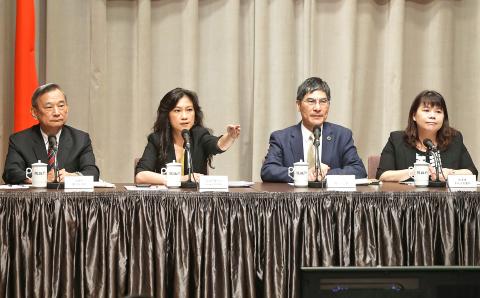The Cabinet yesterday passed draft amendments to the Act Governing Relations Between the People of the Taiwan Area and the Mainland Area (台灣地區與大陸地區人民關係條例) that would increase fines for Chinese or Chinese institutions that illegally invest in Taiwan.
The draft bill has been listed as a priority for the current legislative session.
Under the proposed amendments, any Chinese investor or enterprise that invests in Taiwan without getting permission from the authorities could be subject to a fine ranging from NT$50,000 to NT$25 million (US$1,633.88 to US$816,940), compared with the current range of NT$120,000 to NT$600,000, plus rectification.

Photo: CNA
Failure to rectify the matter could lead to consecutive fines until the situation is remedied.
The Mainland Affairs Council was prompted to amend the law by a 2016 case in which Chinese investors purchased about NT$1 billion of Tatung Co (大同) shares through SinoPac Securities (Asia) Ltd (永豐金證券亞洲), a Hong Kong-based brokerage subsidiary of SinoPac Financial Holdings Co (永豐金控), in a breach of the rules governing cross-strait investments, MAC Deputy Minister Lee Li-jane (李麗珍) told a news conference at the Executive Yuan in Taipei.
The Chinese investors were fined just NT$600,000 under Article 93-1 of the act, which drew public protests and calls for change, Lee said.
The fines could also be increased depending on the amount of profits made through investments deemed to be illegal, Deputy Minister of Justice Chen Ming-tang (陳明堂) told the news conference.
“If a Chinese person or institution made more than NT$25 million in profit from such illegal investments, Item 2, Article 18 of the Administrative Penalty Act (行政罰法) would allow the government to raise the fine to the amount of the illegal gain,” Chen said.
For instance, if a Chinese investor was found to have made NT$100 million from an illegal investment in Taiwan, they could face a maximum fine of NT$100 million, Chen said.
Under the proposal, any Chinese enterprise allowed to invest in Taiwan that contravenes the rules — such as failure to file financial statements and illegally reinvesting — could face a fine ranging from NT$50,000 to NT$2.5 million, up from the original range of NT$60,000 to NT$300,000.
The proposed amendments include a provision to punish any Chinese enterprise that evades, impedes or refuses inspections by the authorities.
Another provision would allow minor violators of the law to be exempted from fines if they are able to remedy the situation within a specified time period.

SECURITY: As China is ‘reshaping’ Hong Kong’s population, Taiwan must raise the eligibility threshold for applications from Hong Kongers, Chiu Chui-cheng said When Hong Kong and Macau citizens apply for residency in Taiwan, it would be under a new category that includes a “national security observation period,” Mainland Affairs Council (MAC) Minister Chiu Chui-cheng (邱垂正) said yesterday. President William Lai (賴清德) on March 13 announced 17 strategies to counter China’s aggression toward Taiwan, including incorporating national security considerations into the review process for residency applications from Hong Kong and Macau citizens. The situation in Hong Kong is constantly changing, Chiu said to media yesterday on the sidelines of the Taipei Technology Run hosted by the Taipei Neihu Technology Park Development Association. With

CARROT AND STICK: While unrelenting in its military threats, China attracted nearly 40,000 Taiwanese to over 400 business events last year Nearly 40,000 Taiwanese last year joined industry events in China, such as conferences and trade fairs, supported by the Chinese government, a study showed yesterday, as Beijing ramps up a charm offensive toward Taipei alongside military pressure. China has long taken a carrot-and-stick approach to Taiwan, threatening it with the prospect of military action while reaching out to those it believes are amenable to Beijing’s point of view. Taiwanese security officials are wary of what they see as Beijing’s influence campaigns to sway public opinion after Taipei and Beijing gradually resumed travel links halted by the COVID-19 pandemic, but the scale of

A US Marine Corps regiment equipped with Naval Strike Missiles (NSM) is set to participate in the upcoming Balikatan 25 exercise in the Luzon Strait, marking the system’s first-ever deployment in the Philippines. US and Philippine officials have separately confirmed that the Navy Marine Expeditionary Ship Interdiction System (NMESIS) — the mobile launch platform for the Naval Strike Missile — would take part in the joint exercise. The missiles are being deployed to “a strategic first island chain chokepoint” in the waters between Taiwan proper and the Philippines, US-based Naval News reported. “The Luzon Strait and Bashi Channel represent a critical access

Pope Francis is be laid to rest on Saturday after lying in state for three days in St Peter’s Basilica, where the faithful are expected to flock to pay their respects to history’s first Latin American pontiff. The cardinals met yesterday in the Vatican’s synod hall to chart the next steps before a conclave begins to choose Francis’ successor, as condolences poured in from around the world. According to current norms, the conclave must begin between May 5 and 10. The cardinals set the funeral for Saturday at 10am in St Peter’s Square, to be celebrated by the dean of the College